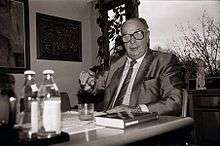Veikko Vennamo

Veikko Emil Aleksander Vennamo (originally Fennander) (11 June 1913 – 12 June 1997) was a Finnish politician. In 1959, he founded the Finnish Rural Party (Suomen Maaseudun Puolue), which was succeeded by the True Finns in 1995. He had originally been the leader of a faction of the Agrarian League. When his opponent, Urho Kekkonen, was elected president of Finland, Vennamo broke off his Agrarian League affiliation. Vennamo was a member of Parliament in 1945–1962 and 1966–1987.
Vennamo was born in Jaakkima, Ladoga Karelia, now in Russia (see, for example Finnish Yearbooks What Where When (Mitä Missä Milloin)). He was one of the loudest and most prominent critics of President Kekkonen. He also criticized the centre-left governments of the 1960s and 1970s for worsening the living conditions of small farmers and poor workers, for example by favouring the big cities at the expense of the rural towns in abolishing small schools and grocery stores.
He was a presidential candidate in 1968, 1978 and 1982. In the 1968 presidential election, he negatively surprised President Kekkonen and his centre-left allies by getting 11% of the votes. The populist Rural Party got 9% of the deputies in the 1970 and 1972 parliamentary elections, and 8.5% of the deputies in the 1983 parliamentary elections. After the 1983 elections, the Rural Party was allowed to join the government, but Vennamo preferred not to become a cabinet minister.
In the 1988 presidential election, he supported the reelection of President Mauno Koivisto (see, for example, Seppo Zetterberg et al., eds., A Small Giant of the Finnish History (Helsinki: Werner Söderström Publishing Ltd., 2003), pgs. 843, 844, 859, 861, 884, 888, 889, 900 and 901; Pentti Virrankoski, A History of Finland 1-2, 2nd revised edition (Helsinki: Finnish Literature Society, 2009), pg. 957; What Where When - The Citizen's Yearbook 1989, Helsinki: Otava Publishing Ltd., 1988).